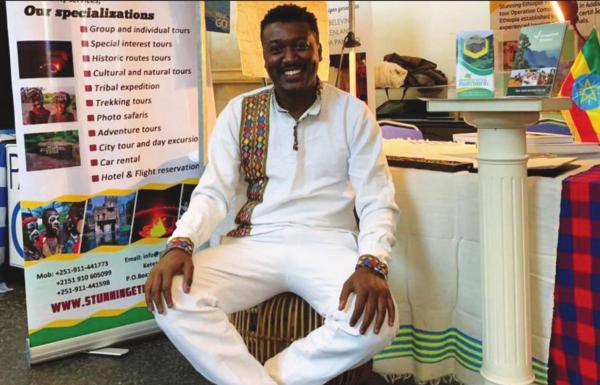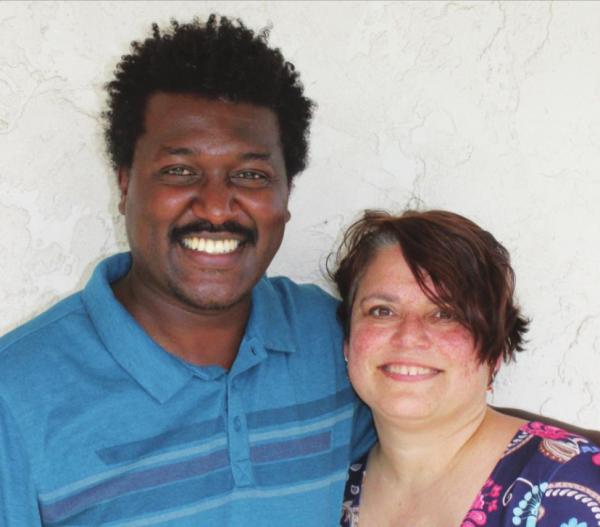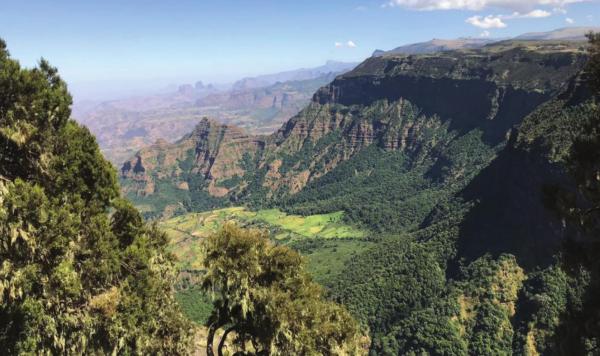A new continent, a new life, a new home
People come to Wimberley from all over.
Houston. California. Austin. New York. You name it.
But not many find their way here from Addis Ababa, Ethiopia.
One of Wimberley’s newer residents, Ermias Ketema Gebremeskel, is settling into life in the Hill Country. Ermias (pronounced air-ME-us) has taken up golf, enjoys Texas-style barbecue and volunteers at the Wimberley Village Library. Recently, he hosted a program at the library that covered Ethiopia’s rich history, unique religions and ancient customs.
Ermias and local attorney Carrie Campbell were married on Oct. 24 of last year. They met when Ermias hosted a service group from the Wimberley Rotary Club. Carrie and other members of the Rotary were in Ethiopia to help improve area schools and take supplies to orphanages. They had courted — sometimes at long distance — for a couple years.
Now that Ermias has settled into Wimberley he plans to get the necessary paperwork to start organizing tours of Ethiopia. He first needs a work permit, then permanent residency as he starts down the path to becoming an American citizen.
While he misses family and friends in Addis Ababa, he is busy exploring life in Texas. “It (Texas) is big and there are so few people,” Ermias says.
Ancient history
Ethiopia’s history goes way, way back. In fact, the oldest modern-human skeletal remains found there are about 200,000 years old.
“It’s the cradle of mankind,” Ermias says.
Ethiopia is home to Lucy. The fossilized female skeleton that was uncovered in 1974 in the Awash Valley by paleoanthropologist Donald Johnson of the Cleveland Museum of Natural History. Lucy — who was named after the Beatles’ song “Lucy in the Sky With Diamonds” — dates back some 3.2 million years.
He points out that Ethiopia is the lone African nation that was never colonized, although Italy — under dictator Benito Mussolini — invaded and occupied the country in the late 1930s. (Some list Liberia as another African nation that was never colonized; while others contend Liberia was, in effect, an American colony until it gained independence in 1847.)
“It (Ethiopia) doesn’t have a European feel to it,” Ermias explains. “It’s really the only African country that’s still real Africa.”
Ethiopia is primarily a Christian country, with a sizable Islamic population. It is mentioned in the King James version of the Bible more than 40 times. From Psalms 68: “Princes shall come out of Egypt; Ethiopia shall soon stretch out her hands unto God.”
The country has suffered famines throughout its history. One of the worst was in the 1980s when more than a million people died and millions more were displaced. Hundreds of thousands of children became orphans. Rock stars wrote songs and staged concerts to help with famine relief. The song “We Are the World” — written by Michael Jackson and Lionel Ritchie — sold 20 million copies and raised millions to help the effort.
“In most peoples’ minds, it’s all about the famine, but Ethiopia is so much more than that,” says Ermias.
Ethiopia is the second most populous country in Africa with about 110 million people (only Nigeria has a larger population). It’s almost twice as big as Texas and has mountain peaks that soar close to 15,000 feet. The capital Addis Ababa sits on a plateau that is 7,700 feet high so, even though it’s just north of the equator, the temperatures are moderate.
“No one has heaters or air conditioners there,” says Carrie. “You don’t need them. When I’m there I just take a light coat with me.”
Ethiopia’s legendary long-distance runners train in the high elevation and, as a result, routinely win prestigious marathons and Olympic gold medals.
Ethiopian tourism
Ermias operates Stunning Ethiopia Tours, which is how he met Carrie. The travel service gets rave reviews on Trip Advisor. But Ermias just shakes his head now. The travel industry has been devastated by the coronavirus and there haven’t been many tour groups in the past year.
His father died when he was three and he was raised by his mother in Addis Ababa. He attended Addis Ababa University and got a degree in biology. Then decided the tourist industry was more rewarding. He returned to college to study tourism and business administration. “When I got my knowledge, I decided to go into business for myself,” he says.
Ermias speaks English, French and some Hebrew as well as his native tongue, Amharic.
Along with his brother he started Stunning Ethiopia Tours eight years ago.
There are some regions of Ethiopia that are best avoided. “We have some notorious neighbors,” he points out. But, he says, Ethiopia has much to offer. There are more than 800 species of birds in the country which makes it a paradise for birdwatchers. The mountains and valleys are great for hiking and climbing. There are 11 UNESCO World Heritage sites in Ethiopia so there’s something for every history buff.
There are numerous national parks in Ethiopia but, over the years, wildlife has dwindled due to poaching and illegal hunting. Visitors can still spot a giraffe or an elephant. Long-haired baboons abound.
Ermias also specializes in setting up tours for church groups and service organizations who want to lend a hand in this developing nation.
Around Texas
So while Ermias waits for the tourism industry to rebound, he is getting used to the Hill County.
He says he doesn’t mind the hot weather; it’s the cold weather that bothers him. He got a good taste of cold a few weeks back.
At home, he has an extra blanket on his side of the bed.
He can often be found on the golf course in Woodcreek. There was one golf course in all of Ethiopia. “It was for the upper-class society,” Ermias says. “I always considered golf for the upper society.” Now he plays once a week.
He’s quickly grown fond of Texas-style barbecue, but also likes Mexican food. “It’s spicy like Ethiopian food.”
There are Ethiopian restaurants as well as an Ethiopian market in Austin where he can get ingredients to make his favorite dishes.
There are other things he’s getting used to: “People here drive big trucks — and they drive them very fast,” he says. He notes that time is more precious here. A planned hour-long meeting in Ethiopia often stretched into three or four hours. In the U.S., a meeting set for an hour, usually lasts an hour.
Coffee’s important
Ethiopia is considered by many to be the birthplace of coffee. Today, more than 12 million Ethiopians are involved in the cultivation, picking and processing of coffee.
As Ethiopian legend has it, a goat herder watched as his flock eat wild coffee beans and became hyper and loud. Curious, the herder took some of the beans to a nearby monastery where the monks — considering the beans to be the devil’s handiwork — tossed them in the fire. The smell of the roasting beans changed their minds and coffee was born.
Ermias is toying with the idea of importing Ethiopian coffee.
He’ll be bringing a little of Ethiopia to Wimberley on April 30 at 1 p.m. when he will perform an Ethiopian Coffee Ceremony at the library. According to the website Spruce Eats, “The lengthy Ethiopian coffee ceremony involves processing the raw, unwashed coffee beans into finished cups of coffee. It begins with the preparation of the room for the ritual…After the first round of coffee, there are typically two additional servings. The three servings are known as abol, tona, and baraka. Each serving is progressively weaker than the first. Each cup is said to transform the spirit, and the third serving is considered to be a blessing to those who drink it.”
All in all, it has been a smooth transition from Ethiopia to the Texas Hill Country. “People have been so very nice to me,” Ermias says. “Everyone takes it for granted, but this is a land of opportunity. I think this country is 50 percent heaven.”
To learn more about Stunning Ethiopia Tours visit www.stunningethiopiatours.com.
To get involved with Ethiopia visit www.davismoonproject.org.




